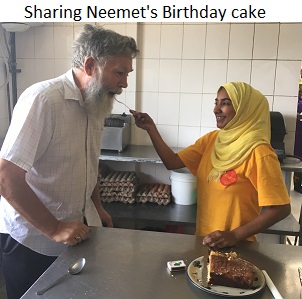It was our last full week at Neema. Ben and Katy come back and on 1st May we fly back to the UK.
For Irene she returned to one of her first jobs - tying string onto price tags ready for the craft market in Dar es Salaam in 2 weeks time. However, she was delighted that Dom had redesigned the labels so they were much easier to put together.
There was also time for one last Football Match. The team got a new ball and we travelled with supporters on the 50 mile journey to a small village.
The trip had several purposes. In addition to an exciting game of football, it was an opportunity to attract visitors to the church so they could hear the gospel, and to hear that disabled and deaf people can be of great value to their communities if they are given the right support.
The match was exciting - trailing 1 - 0, Neema then scored 2 goals, only to let one in in the last few minutes . 2 -2 ; a fair result.



















































